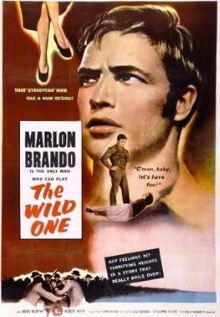This is a notable early Marlon Brando film that in of itself probably isn’t that important in the annals of cinematic history. Yet the iconic image of the tough biker in a leather jacket that we are so familiar with today probably first got its start here. In its own time, this look was copied by people like James Dean and Elvis Presley while closer to our time, this look helped launched Arnold Schwarzenegger to stardom. The film itself isn’t that good but it is interesting in that it doesn’t completely condemn the motorcycle gang that comes to wreck a small town as one might expect for a film of this era.
A motorcycle club consisting of abrasive members wearing leather jackets barges into a motorcycle race being held in a small town, making a nuisance of themselves. When they are confronted by the police, their leader Johnny Strabler chooses to leave though not before one of his gang members steals a trophy. They stop in the next town over and cause a minor accident with a car driven by an elderly man and hang out in the local bar. The bar’s owner welcomes the business and Johnny is interested in the waitress Kathie who works there. But the longer the gang stays, the more rowdy the bikers get, causing some of the residents to be worried. Furthermore the town only has a single lawman, the elderly Harry who happens to be Kathie’s father and who admits to being too weak to control them. Things only get worse when a rival gang arrives and their leader deliberately picks a fight with Johnny while other locals decide that they need to impose order on their own.
Production-wise this film is nothing special, even looking really bad during close-up visuals of the bikers riding as they are clearly fake shots of them superimposed onto the background. I also felt that many of the bikers look a bit too old to be the delinquent punks they are meant to be in this film. Marlon Brando is of course as effortlessly smoldering as he always is as Johnny but he is the only one of the bikers to have any depth at all. The rest seem interested only in raising hell for the fun of it, including Chino the rival gang leader who is resentful that they were all once part of the same gang but Johnny led his faction to split away. There’s no indication of why the members of Johnny’s gang follow his orders so loyally when he tempers their worst excesses. One particular scene for example seems like it could have gotten very ugly, as the bikers surround Kathie and keep circling around her while she tries to get away, until Johnny swoops in to rescue her. Whatever sympathy the film tries to engender for Johnny himself, it clearly shouldn’t extend to his friends who are opportunists and bullies.
The only really interesting bit of the film, apart from the visual imagery of the bikers themselves, is Katie questioning Johnny as to what he wants. As he explains, it’s not about riding to any particular destination, it’s about riding itself as a way to get away from it all. The worst insult he can dish out is accusing people of being square, of being submissive to authority and staying within the lines of where society expects you to be. The problem is that this is the same sort of youthful angst that would be immortalized so much better only two years later in James Dean’s Rebel Without a Cause, thus making this kind of superfluous. The film also has trouble making up its mind whether or not the bikers are simple criminals. This is probably because it was inspired by a real-life event in which the reporting was sensationalized to fan moral outrage at the time. I feel that this film therefore tries to have it both ways. It does want to scare the audience of how much trouble a large gang of bikers could cause in a small town when law enforcement is weak but it also wants to show how overzealous citizens can go too far in enforcing order. So the end result is that the film is in favor of a strong and steady police response? That doesn’t really work at all.
I was still glad to have watched this out of curiosity and because of its cultural significance but this is not a film that is really that good. The director was László Benedek who was Hungarian-born and I suspect he had difficulty capturing the very American crisis of identity that ought be at the heart of the film and instead turned it into a straightforward question of law and order.
